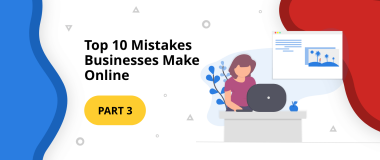One of the most important jobs of digital marketing professionals is to keep up with the latest search engine algorithm changes and test new strategies to help brands rank higher in search results. The foundation of any successful website is in performing quality keyword research and including the best ranking ones in your content. Wondering how to pick the right keywords for your website?
Let us find out the basics.
What Are Keywords?
Keywords are the words or phrases used by a user when searching for something through search engine websites. They define the needs of users and signify what a visitor is looking for on your website.
Keywords and Search Engine Optimization are two concepts which are greatly correlated.
Definition of SEO

Search engine optimization (SEO) refers to the process of improving website performance and traffic as a result of organic searches on different search engine websites. The increase in traffic should both be in quality and quantity.
While keywords are not the only element of your website SEO, they play a crucial role in it. They help both users and search engines understand what your content is about, and as such influence where your site shows up in the result pages after a user has entered their query.
Additionally, considering factors like relevance, search volume, keyword difficulty and search intent, keywords have a significant effect on brand awareness and on your site’s overall ranking. Hence, learning how to choose best keywords for SEO is essential for your content’s success.
How Do Search Engines Work?
Keywords will not play their role without a search engine. Customers will not find the answer to their needs without a search engine. So how does a search engine really work?
- The work of a search engine starts at a query or search from an Internet user. With a need for information, the Internet user keys in keywords or phrases in a search engine website. This search will result in various answers, giving the user links to website pages offering relevant information based on the requirements of the user. This is where most of the action takes place.
- After the search engine analyzes the keywords, it provides a list of relevant pages. The rankings of these pages did not happen just because it has to. There are website pages ranked first while there are pages that are ranked last. All of these are caused by optimization of searches through search engines.
There are three basic stages of a search engine, as follows:
- Crawling – The contents are found.
- Indexing – The contents are analyzed and stored in online databases.
- Retrieval – A ranked list of contents are shown to users.
All of these three stages will run smoothly with the proper Search Engine Optimization techniques. Now going back to keywords, no search engine can function without these. Keywords kick-start the search process until the most relevant details are provided to users.
To rank well with search engine sites, you must know how to pick the right keywords in your content. The articles you post in your blog must have the relevant information and keywords so that, when search engines analyze the content of your site, these search engines will find and retrieve all the relevant information the user needs.
Related: How to Improve Your Google SEO Score in 3 Steps
A Guide to How to Pick the Right Keywords
There are various things you can do in selecting the right keywords. Let us show you how to choose keywords for your website and create the perfect content.
Here are some pointers:
1. Focus On Your Product or Service

The keywords you put in your content must be related to your product or service. These phrases should be relevant to what you offer and should accentuate the features of the product(s) or service(s).
Example: You sell athletic footwear for men and women. You have a website and social media accounts, particularly Facebook, Twitter, and Instagram. You want your customers to know that you exist through search engine optimization. The sample keywords you can use include the following: Women’s Shoes, Men’s Footwear, Athlete’s Shoes, Best Athletic Footwear, Sporty Shoes, Men and Women’s Sports Shoes, etc.
2. Identify Your Target Market
Understand who is your target market. This will give you a better idea of what strategies to use when capturing their interest.
Start with segmenting your audience into relevant groups based on demographic, geographics, behavioural and psychological characteristics. Then define what your target market wants, what information they will need in the future and what their purchase decisions will be. Different classification of the target market will require you to have different sets of keywords as well.
Example: You sell apparel to both men and women. This includes corporate suits, casual outfits and stylish clothing for both genders. The sample keywords you may want to try include the following: Fashion Clothing, Men’s Corporate Attire, Best Apparel Brands, Casual Attire for Women, Men’s Jeans’, Women’s Dresses, etc.
3. Know the Location

Your social media marketing and digital efforts actually support your offsite marketing plans and overall goals for the company. The sales generated from online sales add up to the sales made at the actual store. At some point, there may be geographical considerations and thus, become keywords as part of your content, you have to be very specific and focus on those keywords.
Example: You are the owner of a pastry shop somewhere in Seattle. You are confident that you have the best pastries and people even from outside of Seattle will love your products. In your Facebook, Instagram and blog site, you decide to promote your pastry shop using the keywords “Best Pastry Shop in Seattle”, “Seattle’s Loved Pastry Shop”, “No. 1 in Seattle”, etc.
4. Consider Long-Tail Keywords
As Hubspot stated, “The key to successful SEO is concentrating on long-tail keywords.”
Long-tail keywords are highly targeted phrases composed of three or four words that are specific to your product, service, location, and brand,with low search volume and low competition. Internet users normally key in long phrases to get better results for their searchers, hence why these types of keywords result in more conversions.
Additionally, long-tail keywords are much more effective for targeting niche audiences, and work really well if you want to create targeted ad campaigns at a lower cost.
Examples of long-tail keywords are as follows:
- Best Fashion Designer in New York
- Fast Weight Loss Diet
- Affordable Travel Package Tour
5. Check Your Keywords
After you have chosen a set of keywords, make sure that you check them for effectiveness. One of the most important factors to consider when choosing keywords to increase your visibility is relevance. The more specific your keywords are, the better chances the search engine sites will find your content.
Below is the list of best tools to help you find and check the most relevant keywords:
- Ahrefs
- Accuranker
- Google Keyword Planner
- Google Trends
- HubSpot’s Keywords Tool
- Keyword Tool.io
- Moz’s Keyword Explorer Tool
- SEMRush
6. Monitor Your Keywords

Listing a few keywords to drive traffic to your website is not enough to keep your content relevant. You have to check and monitor your keywords from time to time. This has been overlooked by some marketers, yet it’s a very important part of any go-to-market strategy. Keywords must be evaluated since customer preferences also change over time. This means that the words they key in search engine sites changes.
For example, your customers may look for the “Best Baby Crib” during their first search. After a few weeks, the same exact customers, who have not bought a baby crib yet, may look for cribs again by keying in “High-Quality Baby Crib” or “Baby Crib for Traveling”. This explains why it is important to monitor your keywords by understanding what your customers are searching for.
Conclusion
Now that you know the basic details of keywords and how Search Engine Optimization works, you are already set on how to pick the right ones for your content. When creating keywords, always remember to focus on your Product or Service, Target Market, Location, and Long-Tail Keywords. Once you have them, make sure to check and monitor them accordingly.
Go out there and start discovering how to pick the right keywords for your content. If you need expert assistance in keyword generation and SEO, it is best to get in touch with DevriX, the best WordPress development agency.




